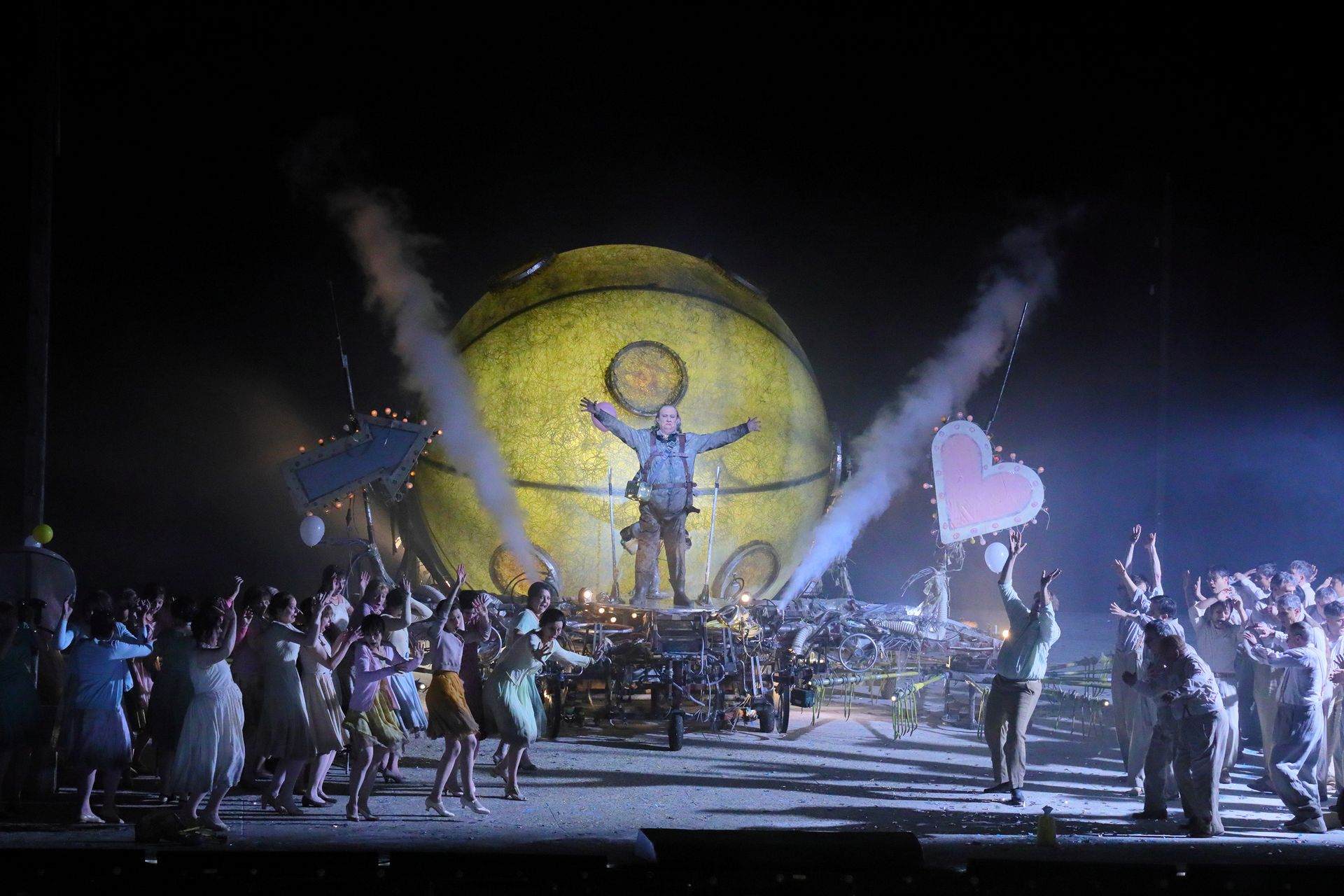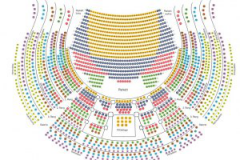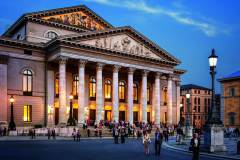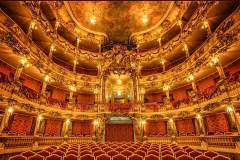L'elisir D'amore
Mo | Tu | We | Th | Fr | Sa | Su |
Act One
Nemorino is in love with Adina but has nobody in whom he can confide, least of all the woman he adores. He is full of admiration for her: she seems to him to be so clever and, above all, so very beautiful. He laments about himself, however, for being stupid and without means. For her part, Adina is interested in what she has just been reading, the story of Tristan and Isolde. She has also taken a fancy to Belcore, one of a detachment of soldiers stationed in the area. Belcore loses no time in proposing marriage to Adina the first time they meet – he urges her rapid acceptance – the wedding tomorrow and back to the battlefield the day after.
Nemorino is now forced to act: he begs for a word with Adina and tells her how desperately he loves her. But Adina rejects him, saying that his feelings are in vain and he should rather look after his sick old uncle.
A glimmer of hope now appears on the horizon for Nemorino, however, in the person of Dulcamara, who claims to be able to cure all the ailments in the world with his potions. Nemorino asks Dulcamara about the magic potion, an elixir of love, which he has heard Adina reading about in the story of Tristan and Isolde. Dulcamara, who never misses a chance to do business, sells the delighted Nemorino a love potion and promises him that the object of his passion will be his within twenty-four hours. Nemorino has hardly swallowed the elixir – which is a pure Bordeaux – before his self-esteem begins to grow. Nemorino no longer seems worried at the thought of Adina’s imminent wedding. This change in Nemorino, his seeming indifference, merely makes Adina defiant. She decides to marry Belcore that same day. Nemorino is horrified as he sees time working against him.
Act Two
As part of the wedding celebrations Dulcamara wants to entertain the guests by singing a barcarolle with Adina; the story tells of how a young gondoliera, Nina, rejects a senator’s wealth in order to marry instead the poor young man, Zanetto, whom she loves.
Nemorino – now under pressure – asks Dulcamara for another dose of the elixir, but Dulcamara will not sell him one for less than 20 scudi and Nemorino no longer has enough money. Belcore, who sees in this a good opportunity to get rid of his rival, offers Nemorino 20 scudi if he will enlist in his regiment. Nemorino signs up with no hesitation.
When the rumour spreads that Nemorino’s uncle has died, leaving him a fortune, he suddenly becomes a good catch as a husband. Nemorino, who still has not heard the news, puts the amazing behaviour of the village girls down to the fact that the potion he has just bought and drunk is working. Adina, who also has no idea that Nemorino has become so wealthy, is astonished to see how popular he is with the girls – and learns from Dulcamara the supposed reason for Nemorino’s behaviour: the elixir. He also offers her a love potion but she declines with thanks – saying she prefers to rely on her own powers of judgement. Out of pity for Nemorino she buys him out of his contract with the military. Nemorino, however, would rather die on the battlefield than live without Adina. Adina finally admits her feelings for Nemorino and breaks her engagement to Belcore, who has no alternative than to follow orders and go off to war. Nemorino is overjoyed and puts his unexpected success with Adina down to Dulcamara’s potion – and the latter is also completely amazed by the miracles which his elixir has brought about.
Program and cast
Melodramma in two acts (1832)
recommended for 8 years and older
In Italian. With English and German surtitles.
Duration approximately 2 hours 45 minutes
Conductor: Michele Spotti
Production: David Bösch
Set Design: Patrick Bannwart
Costume Design: Falko Herold
Lighting: Michael Bauer
Dramaturgy: Rainer Karlitschek
Choruses: Franz Obermair
Adina: Mané Galoyan
Nemorino: Liparit Avetisyan
Belcore: Andrzej Filończyk
Dulcamara: Ambrogio Maestri
Giannetta: Seonwoo Lee
Bayerisches Staatsorchester
Chorus of the Bayerische Staatsoper
National Theatre Munich
The National Theatre Munich (German: Nationaltheater München) is an opera house in Max-Joseph-Platz in Munich, Germany. It is the home of the Bavarian State Opera and the Bayerisches Staatsballett(Bavarian State Ballet).
The Bavarian State Opera also performs in the Prinzregententheater, which opened in 1901 and, like the Bayreuth Festspielhaus, is built to Richard Wagner's specifications, and in the Cuvilliés Theatre at the Residenz, constructed in 1751–1753 and described by Thierry Beauvert as "a Rococo gem".
The Nationaltheater is very easy to get to both by car and by MVV public transportation.
By MVV public transportation
S-Bahn: S 1 - 8 Marienplatz
U-Bahn: U 3, 6 Marienplatz, U 3 - 6 Odeonsplatz
Bus: 52, 131 Marienplatz, 100 Odeonsplatz
Straßenbahn: 19 Nationaltheater
On the day of the performance, holders of regular tickets are entitled to use public transport provided by the Münchner Verkehrsverbund (MVV). This service starts at 3 pm respectively three hours before the performance commences and ends with the closing hour of the MVV.
By Car
Take the Altstadt-Ring to Maximilianstraße.
Parking garage Max-Joseph-Platz: open Monday to Sunday from 6:00 A.M. to 2:00 A.M.
You can take advantage of the special theatre parking fee of Euro 10,- from 6:00 P.M. to 8:00 A.M. by presenting your admission tickets.

 EN
EN DE
DE IT
IT FR
FR ES
ES RU
RU JP
JP RO
RO
 Seating plan
Seating plan 
